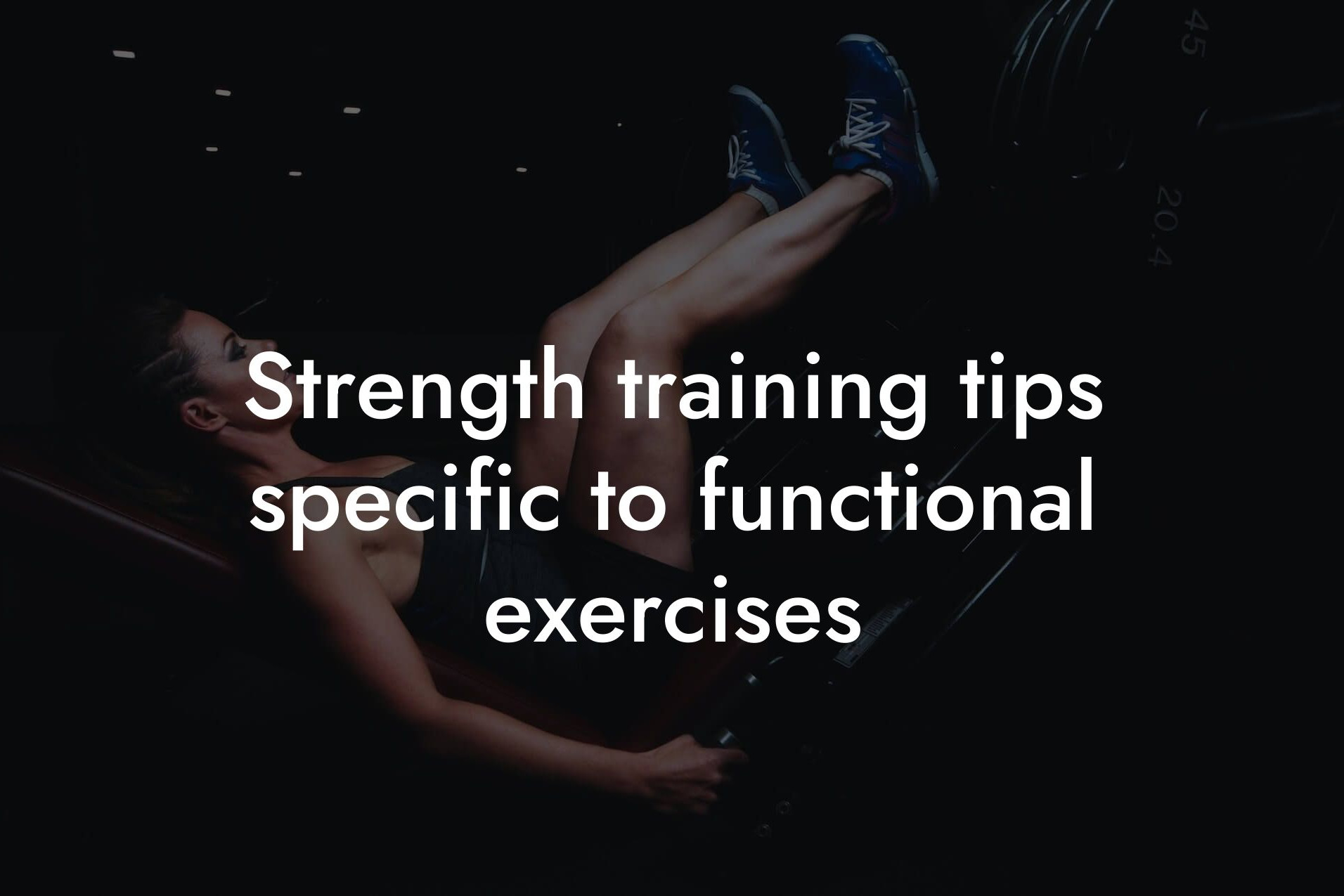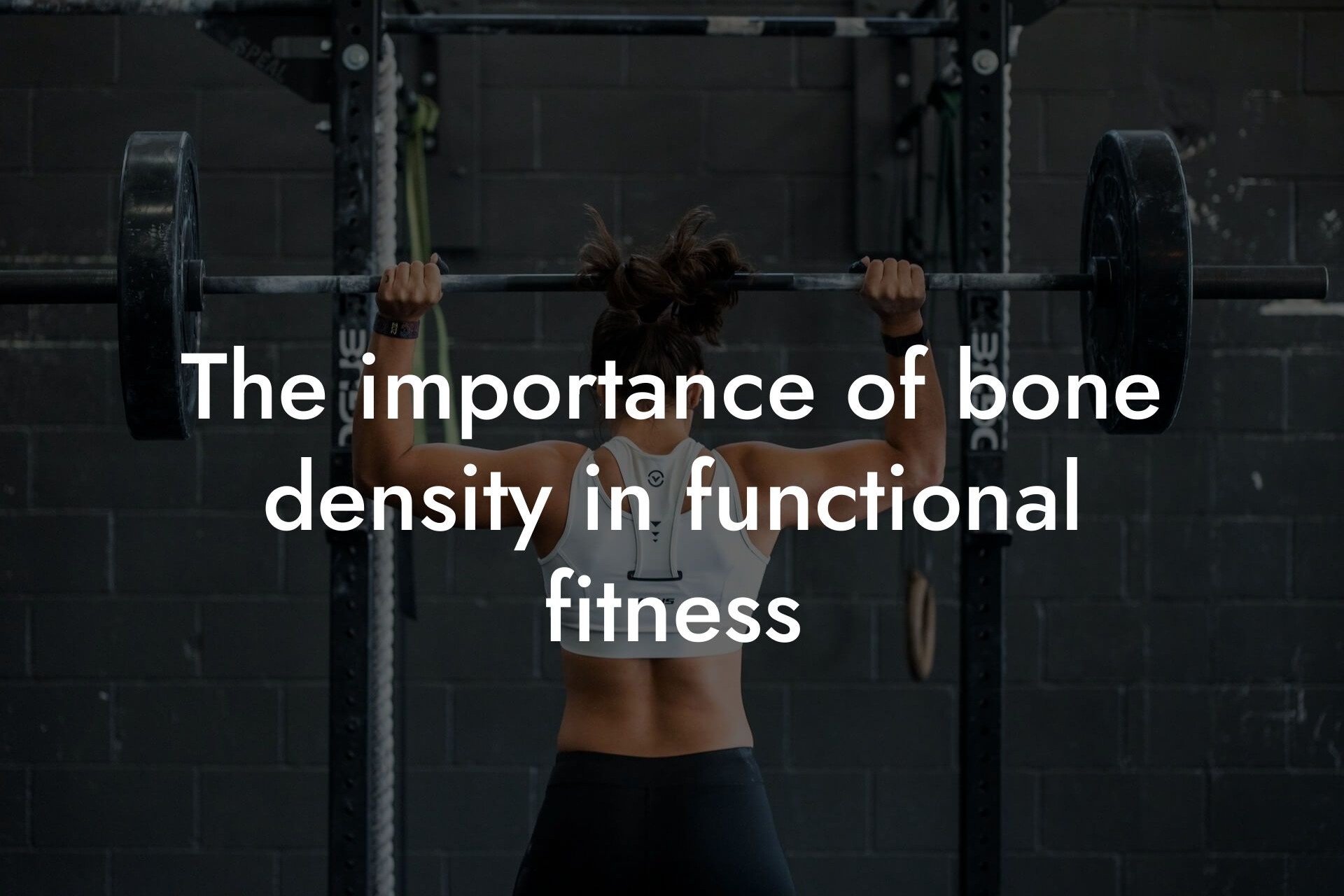As a functional training enthusiast, you understand the importance of fueling your body to optimize performance and achieve your fitness goals. A well-planned nutrition strategy can make all the difference in your training, recovery, and overall health. In this article, we'll delve into the essential nutrition strategies for functional training enthusiasts, providing you with the knowledge to take your training to the next level.
Table of Contents
- Macronutrient Balance: The Foundation of Functional Training Nutrition
- Carbohydrates: The Primary Energy Source for Functional Training
- Protein: The Building Block of Muscle Tissue
- Fat: The Energy Source for Low-Intensity Activities
- Hydration: The Often-Overlooked Component of Functional Training Nutrition
- Meal Frequency and Timing: Fueling Your Workouts
- Supplements: Do You Really Need Them?
- Periodized Nutrition: Tailoring Your Diet to Your Training Phases
- Putting it All Together: A Sample Meal Plan for Functional Training Enthusiasts
- Frequently Asked Questions
Macronutrient Balance: The Foundation of Functional Training Nutrition
When it comes to functional training, a balanced diet that provides the right amount of macronutrients is crucial. Macronutrients are the three main categories of nutrients that provide energy and support growth and maintenance: carbohydrates, protein, and fat. A general guideline for functional training enthusiasts is to aim for the following macronutrient ratios:
Carbohydrates: 2-3 grams per kilogram of body weight (45-55% of daily calories)
Protein: 1.6-2.2 grams per kilogram of body weight (15-20% of daily calories)
Fat: 0.5-1 gram per kilogram of body weight (20-30% of daily calories)
These ratios serve as a general guideline, and individual needs may vary depending on factors such as training intensity, frequency, and goals. For example, if you're an endurance athlete, you may require more carbohydrates to fuel your long-duration activities.
Carbohydrates: The Primary Energy Source for Functional Training
Carbohydrates are the body's primary source of energy for high-intensity, short-duration activities like functional training. They're stored in the muscles and liver as glycogen, which is broken down into glucose and used as energy during exercise. Focus on complex carbohydrates such as:
Whole grains: brown rice, quinoa, whole wheat bread, and whole grain pasta
Fruits: bananas, berries, apples, and oranges
Vegetables: sweet potatoes, broccoli, carrots, and leafy greens
Legumes: lentils, chickpeas, and black beans
Protein: The Building Block of Muscle Tissue
Protein is essential for muscle growth, repair, and maintenance. As a functional training enthusiast, you require adequate protein to support muscle recovery and growth. Aim to consume protein from a variety of sources, including:
Lean meats: chicken, turkey, and lean beef
Fish and seafood: salmon, tuna, and shrimp
Eggs and dairy: eggs, Greek yogurt, and cottage cheese
Plant-based options: legumes, nuts, and seeds
Protein shakes and supplements can be convenient, but whole foods should be your primary source of protein.
Fat: The Energy Source for Low-Intensity Activities
Fat is an essential macronutrient that provides energy for low-intensity activities like yoga or casual walks. It's also crucial for hormone production and the absorption of fat-soluble vitamins. Focus on healthy fats like:
Avocados and avocado oil
Nuts and seeds: almonds, walnuts, chia seeds, and flaxseeds
Fatty fish: salmon and tuna
Olive oil and coconut oil
Hydration: The Often-Overlooked Component of Functional Training Nutrition
Adequate hydration is critical for optimal performance and recovery. Aim to drink at least 8-10 glasses of water per day, and make sure to drink water during and after your workouts. You can also consume electrolyte-rich beverages like coconut water or sports drinks to replenish lost electrolytes.
Meal Frequency and Timing: Fueling Your Workouts
Meal frequency and timing play a crucial role in functional training nutrition. Aim to eat 3-5 main meals and 2-3 snacks per day, spaced out every 2-3 hours. This will help maintain stable energy levels and support muscle recovery. For workouts, aim to eat a balanced meal or snack 1-2 hours prior, and consume a post-workout meal or snack within 30-60 minutes after exercise.
Supplements: Do You Really Need Them?
Supplements can be a convenient way to support your nutrition strategy, but they shouldn't replace whole foods. If you're considering supplements, focus on the following:
Protein powder: a convenient way to increase protein intake
Creatine: can improve strength and endurance
Branched-Chain Amino Acids (BCAAs): can reduce muscle soreness and improve recovery
Remember to consult with a healthcare professional or registered dietitian before adding any supplements to your regimen.
Periodized Nutrition: Tailoring Your Diet to Your Training Phases
Periodized nutrition involves adjusting your diet to match your training phases. For example, during a high-intensity training phase, you may require more carbohydrates to fuel your workouts. During a recovery phase, you may focus on protein-rich foods to support muscle repair. By periodizing your nutrition, you can optimize your performance and recovery.
Putting it All Together: A Sample Meal Plan for Functional Training Enthusiasts
Here's a sample meal plan to get you started:
Breakfast: oatmeal with banana, almond butter, and eggs
Snack: Greek yogurt with berries and honey
Lunch: grilled chicken breast with quinoa, broccoli, and avocado
Snack: apple slices with almond butter
Dinner: grilled salmon with sweet potato, carrots, and green beans
Before Bed Snack: cottage cheese with cucumber slices and whole wheat crackers
Remember, this is just a sample meal plan, and you should adjust the portion sizes and food choices based on your individual needs and preferences.
Frequently Asked Questions
What is functional training and how does it differ from traditional weightlifting?
Functional training is a type of exercise that focuses on improving coordination, balance, and overall functional ability, rather than just building muscle mass. It typically involves movements that mimic real-life activities, such as squatting, lunging, and lifting, and is often used to improve athletic performance and everyday functional ability. In contrast, traditional weightlifting typically focuses on isolating specific muscle groups and building strength in those areas.
Why is nutrition important for functional training?
Nutrition plays a critical role in functional training, as it provides the energy and building blocks necessary for optimal performance and recovery. A well-designed nutrition plan can help functional training enthusiasts improve their strength, endurance, and overall functional ability, while also reducing the risk of injury and improving overall health.
What are the key macronutrients and how do they support functional training?
The three key macronutrients are carbohydrates, protein, and fat. Carbohydrates provide energy for high-intensity exercise, protein supports muscle growth and repair, and fat provides energy for low-intensity exercise and supports hormone production. A balanced diet that includes all three macronutrients is essential for optimal functional training performance.
How much protein do I need to support functional training?
The International Society of Sports Nutrition recommends that functional training enthusiasts consume 1.6-2.2 grams of protein per kilogram of body weight per day. This can be achieved through a combination of whole foods and supplements, such as protein shakes and bars.
What are the best sources of protein for functional training?
The best sources of protein for functional training include lean meats, fish, eggs, dairy, legumes, and plant-based protein powders. These sources provide all the essential amino acids necessary for muscle growth and repair.
How much carbohydrate do I need to support functional training?
The American College of Sports Medicine recommends that functional training enthusiasts consume 2-3 grams of carbohydrate per kilogram of body weight per day. This can be achieved through a combination of whole foods, such as whole grains, fruits, and vegetables, and sports-specific carbohydrates, such as energy gels and bars.
What are the best sources of carbohydrate for functional training?
The best sources of carbohydrate for functional training include whole grains, fruits, vegetables, and sports-specific carbohydrates, such as energy gels and bars. These sources provide the energy necessary for high-intensity exercise and support optimal performance.
How much fat do I need to support functional training?
The National Academy of Medicine recommends that functional training enthusiasts consume 0.5-1 gram of fat per kilogram of body weight per day. This can be achieved through a combination of whole foods, such as nuts, seeds, and avocados, and healthy fats, such as omega-3 fatty acids.
What are the best sources of fat for functional training?
The best sources of fat for functional training include nuts, seeds, avocados, and healthy fats, such as omega-3 fatty acids. These sources provide the energy necessary for low-intensity exercise and support hormone production.
What is the importance of hydration for functional training?
Hydration is critical for functional training, as it helps regulate body temperature, transport nutrients and oxygen to the muscles, and remove waste products. Aim to drink at least 8-10 glasses of water per day, and make sure to drink water before, during, and after exercise.
What are the best ways to stay hydrated during functional training?
The best ways to stay hydrated during functional training include drinking water, sports drinks, and coconut water. Aim to drink 17-20 ounces of fluid 2-3 hours before exercise, and 7-10 ounces every 10-15 minutes during exercise.
What are the benefits of periodized nutrition for functional training?
Periodized nutrition involves adjusting macronutrient intake based on training phase and goals. This can help functional training enthusiasts optimize performance, improve recovery, and reduce the risk of injury and illness.
How can I periodize my nutrition for functional training?
To periodize your nutrition for functional training, adjust your macronutrient intake based on your training phase and goals. For example, during high-intensity training phases, increase carbohydrate intake to support energy needs. During low-intensity training phases, increase protein intake to support muscle growth and repair.
What are the benefits of meal planning for functional training?
Meal planning can help functional training enthusiasts ensure they are getting the necessary nutrients to support optimal performance and recovery. It can also help reduce stress and anxiety, and improve overall health and well-being.
How can I create a meal plan for functional training?
To create a meal plan for functional training, determine your macronutrient needs based on your training phase and goals, and plan meals that meet those needs. Consider working with a registered dietitian or nutritionist to develop a personalized meal plan.
What are the benefits of supplements for functional training?
Supplements, such as protein powder and creatine, can help functional training enthusiasts optimize performance and recovery. They can also help reduce the risk of injury and illness, and improve overall health and well-being.
What are the best supplements for functional training?
The best supplements for functional training include protein powder, creatine, branched-chain amino acids (BCAAs), and beta-alanine. These supplements can help improve strength, endurance, and overall functional ability.
How can I ensure I am getting enough vitamins and minerals for functional training?
To ensure you are getting enough vitamins and minerals for functional training, consume a balanced diet that includes a variety of whole foods, such as fruits, vegetables, whole grains, lean meats, and healthy fats. Consider taking a daily multivitamin to fill any nutritional gaps.
What are the benefits of post-workout nutrition for functional training?
Post-workout nutrition is critical for functional training, as it helps promote muscle recovery and growth. Aim to consume a meal or snack that includes carbohydrates and protein within 30-60 minutes after exercise.
What are the best post-workout snacks for functional training?
The best post-workout snacks for functional training include bananas with peanut butter, protein shakes with fruit, and energy bars with carbohydrates and protein. These snacks provide the necessary energy and nutrients to support muscle recovery and growth.
How can I reduce muscle soreness after functional training?
To reduce muscle soreness after functional training, consume a meal or snack that includes carbohydrates and protein within 30-60 minutes after exercise, and consider taking anti-inflammatory supplements, such as omega-3 fatty acids and turmeric.
What are the benefits of active recovery for functional training?
Active recovery, such as light cardio and stretching, can help reduce muscle soreness and improve recovery after functional training. It can also help improve overall functional ability and reduce the risk of injury and illness.
How can I incorporate active recovery into my functional training routine?
To incorporate active recovery into your functional training routine, schedule light cardio and stretching exercises into your training plan, and consider working with a trainer or coach to develop a personalized active recovery plan.
What are the benefits of working with a registered dietitian or nutritionist for functional training?
Working with a registered dietitian or nutritionist can help functional training enthusiasts develop a personalized nutrition plan that meets their specific needs and goals. It can also help improve overall health and well-being, and reduce the risk of injury and illness.
How can I find a registered dietitian or nutritionist who specializes in functional training?
To find a registered dietitian or nutritionist who specializes in functional training, search online for professionals in your area who have experience working with functional training enthusiasts, and consider asking for referrals from trainers, coaches, or other athletes.
Here are some related articles you might love...
- Improving functional strength and mobility
- Strength training tips specific to functional exercises
- The importance of bone density in functional fitness
- Preventing injuries in functional training: A comprehensive guide
- Balancing strength, speed, and flexibility in functional training
- Maintaining muscle recovery with functional training
- How DEXA scans can benefit functional training athletes
- The role of body composition in functional training performance
- Reducing body fat for better functional training results
Zak Faulkner
Zak Faulkner is a leading authority in the realm of physical health and body composition analysis, with over 15 years of experience helping professionals optimise their fitness and well-being. As one the experts behind Tano Performance Group, Zak has dedicated his career to providing in-depth, science-backed insights that empower clients to elevate their physical performance and overall health.
With extensive knowledge of DEXA technology, Zak specializes in delivering comprehensive body assessments that offer precise data on body fat, muscle mass, bone density, and overall physique. His expertise enables individuals to make informed decisions and achieve their fitness goals with accuracy and confidence. Zak’s approach is rooted in a deep understanding of human physiology, combined with a passion for helping clients unlock their full potential through personalised strategies.
Over the years, Zak has earned a reputation for his commitment to excellence, precision, and client-focused service. His guidance is trusted by top professionals who demand the best when it comes to their health. Whether advising on fitness programs, nutritional strategies, or long-term wellness plans, Zak Faulkner’s insights are a valuable resource for anyone serious about taking their health and fitness to the next level.
At Tano Performance Group, Zak continues to lead our Content Team revolutionising how professionals approach their physical health, offering unparalleled expertise that drives real results.




